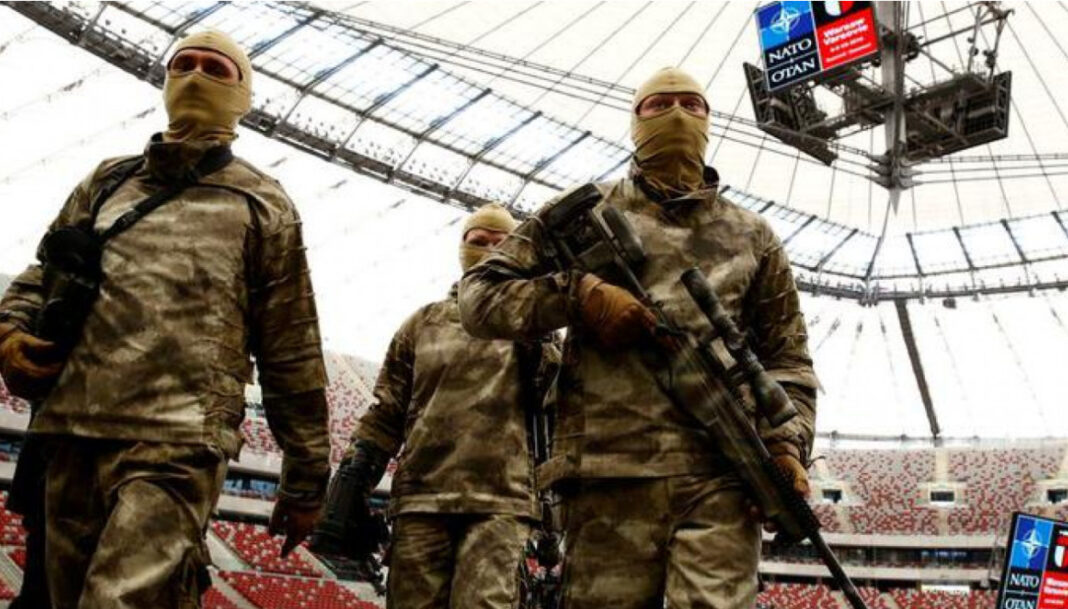July 11, 2016
NATO leaders meeting at the group’s biennial summit in Warsaw have approved the deployment of of four 1,000-men battalions in Poland and the Baltic states.
The summit’s final communiqué claimed that Russian aggression on the edge of NATO territory — as well as the Kremlin’s perceived readiness to use force to attain political goals — was a source of regional instability. Russia’s actions “challenge the Alliance, have damaged Euro-Atlantic security, and threaten our long-standing goal of a Europe whole, free, and at peace,” the statement read.
Speaking at a press conference, NATO Secretary General Jens Stoltenberg said that while NATO was not seeking confrontation with Russia, the conflict in Ukraine and the annexation of Crimea had “changed the rules of the game.”
The decision to deploy more troops was a response to numerous challenges and had been made in an effort to adapt to the changing security situation, he stressed.
Director of the Moscow Carnegie Center, Dmitry Trenin said that the current tensions were not comparable to a Cold War, but could be more problematic for Russia.
“If we compare NATO and Russia now,” he said at the summit’s Experts’ Forum, “then our country lags behind in all areas except perhaps nuclear weapons. In the event of conflict, the weaker side bears the greater risk: it has little time for reflection and must act quickly.
“During the Cold War, despite all our differences and hatred, we still had a dialogue and respect, but now there is none of that. The NATO-Russia Council is used only minimally and has become a tool for managing the confrontation,” he said.
Fundamental differences between NATO and Russia command structures also cause communication problems, some experts claim. The large number of NATO members and the internal disagreements it causes have the potential to work against the alliance.
“Decisions in Moscow are made by a narrow group of people, mostly in uniform,” said former Estonian ambassador to Russia Jüri Luik. “Therefore they understand when you are bluffing. It is fundamentally important that positions be clear and intelligible. It is wrong to first collectively impose sanctions, and to say later that the decision might have been a mistake. The same applies to joint military exercises: there should be no criticism in our ranks. We should not be afraid of offending Moscow; rather, they are the ones acting as if they had been offended,” he said.
With the United States, France and Germany – all key NATO member states – holding elections in the next two years, the likelihood of internal tensions is set to rise. The long-running dispute on who is deemed to be NATO’s key threat is certainly a point for contention, with Poland and the Baltic nations looking eastwards, why other countries look elsewhere. “We should not make a distinction between threats from the east and those from the south,” said Polish Foreign Ministry advisor Przemyslaw Zurawski. “We cannot have internal disagreements. Although Russia cannot influence elections in the United States, the nationalist forces gaining momentum in France and Germany take a pro-Russian stance,” he said.
Military analyst Alexander Golts believes that while NATO’s task is to convince its member states that the alliance is effective, Moscow has something to gain from a confrontation “In the event of a confrontation, Russia becomes a besieged fortress,” Golts said. “Different rules which are advantageous for the Kremlin come into play during a war. It is another question as to whether Moscow can quickly ramp up its forces enough to stage a meaningful response to NATO. Moscow implemented military reforms in the absence of an outside threat and could find it difficult to significantly increase the number of troops in a short period of time,” he said.
This story was originally published in Vedomosti on July 11.



